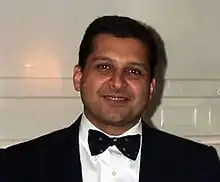Ali Shilatifard
Ali Shilatifard is an American biochemist/molecular biologist, the Robert Francis Furchgott Professor and chairman of the department of biochemistry and molecular genetics, and the director of the Simpson Query Institute for Epigenetics[3][4] at the Northwestern University Feinberg School of Medicine. He has served as a senior editor for the journal Science, and currently serves as the Editor for Science's open access journal Science Advances.[5][6] Research in Shilatifard's lab focuses on the cause of childhood leukemia through chromosomal translocations, the role of ELL in this process, and the discovery of the Super Elongation Complex as being a central complex linking MLL translocations into a diverse number of genes to leukemic pathogenesis. He is an elected fellow of the American Association for the Advancement of Science (AAAS), and elected member of American Academy of Arts & Sciences (AAA&S).
Ali Shilatifard | |
|---|---|
 | |
| Alma mater | |
| Spouse | Laura Shilatifard |
| Children | 4 |
| Awards | Elected member of the American Academy of Arts & Sciences (AAA&S)[1]
Elected Fellow of the American Association for the Advancement of Science (AAAS) ASBMB-AMGEN Award[2] |
| Scientific career | |
| Institutions | |
Biography
Shilatifard has said he developed his love of science as a young boy working with and observing his grandfather,[7] a physician/scientist and professor of medicine of the University of Tehran. Shilatifard moved to the United States in 1984 where he began his study of organic chemistry at Kennesaw State University in Georgia. He began to work on his doctoral degree in biochemistry at the University of Georgia, Athens. Shilatifard completed his Ph.D. from the University of Oklahoma where his mentor, Dr. Richard Cummings, had moved his program. As a Jane Coffin Childs Postdoctoral Fellow at the Oklahoma Medical Research Foundation, Shilatifard identified the first function of any of the MLL translocation partners found in leukemia[8] and proposed that transcriptional elongation control is central to leukemia pathogenesis. Shilatifard began his independent lab in the Edward A. Doisy Department of Biochemistry and Molecular Biology at the St. Louis University School of Medicine, where he identified the first histone H3 lysine 4 (H3K4) methylase in Saccharomyces cerevisiae: which he named Set1/COMPASS;[9][10] and defined the pathway of histone H3K4 methylation which is highly conserved from yeast to human.[11][12] Studies from Shilatifard’s laboratory linking epigenetic factors and transcription elongation control to malignancies have provided therapeutic approaches for the treatment of these cancers.[13][14][15] He also served on the Life Sciences jury for the Infosys Prize in 2017. On April 12, 2019, Shilatifard presented "Childhood Leukemia: On the Edge of Extinction!" at TEDxUofIChicago.[16]
References
- Dimmer, Olivia. "Four Feinberg Faculty Elected to American Academy of Arts and Sciences". Retrieved 30 May 2017.
- Pinholster, Ginger. "2016 AAAS Fellows Honored for Advancing Science to Serve Society". AAAS. AAAS. Retrieved 21 April 2023.
- "Northwestern Receives $10 Million for Epigenetics Center". Philanthropy News Digest. Foundation Center. Retrieved 9 February 2018.
- Di Mento, Maria. "Netflix Co-Founder Reed Hastings Gives $1 Million to Improve Policing (Gifts Roundup)". The Chronicle of Philanthropy. Retrieved 11 June 2020.
- "Editorial Board | Science Advances". advances.sciencemag.org. Retrieved 2018-06-27.
- Shilatifard, Ali (2018). "Impactful science as the guiding principle". Science Advances. 4 (7): eaau1696. Bibcode:2018SciA....4.1696S. doi:10.1126/sciadv.aau1696. PMC 6031368. PMID 29978047.
- Ali Shilatifard: Discovering the roots of cancer, St. Louis Business Journal, Jul 23, 2006
- Shilatifard, A; Lane, WS; Jackson, KW; Conaway, RC; Conaway, JW (March 1996). "An RNA polymerase II elongation factor encoded by the human ELL gene". Science. 271 (5257): 1873–6. Bibcode:1996Sci...271.1873S. doi:10.1126/science.271.5257.1873. PMID 8596958. S2CID 46101044.
- Miller, T.; et al. (2001). "COMPASS: a complex of proteins associated with a trithorax-related SET domain protein". Proc Natl Acad Sci U S A. 98 (23): 12902–12907. Bibcode:2001PNAS...9812902M. doi:10.1073/pnas.231473398. PMC 60797. PMID 11687631.
- Krogan, N. J.; et al. (2002). "COMPASS, a histone H3 (Lysine 4) methyltransferase required for telomeric silencing of gene expression". J Biol Chem. 277 (13): 10753–10755. doi:10.1074/jbc.C200023200. PMID 11805083.
- Smith, E.; Shilatifard, A. (2010). "The chromatin signaling pathway: diverse mechanisms of recruitment of histone-modifying enzymes and varied biological outcomes". Mol Cell. 40 (5): 689–701. doi:10.1016/j.molcel.2010.11.031. PMC 3037032. PMID 21145479.
- Lee, J. S.; et al. (2007). "Histone crosstalk between H2B monoubiquitination and H3 methylation mediated by COMPASS". Cell. 131 (6): 1084–1096. doi:10.1016/j.cell.2007.09.046. PMID 18083099. S2CID 11783020.
- Piunti, Andrea; Hashizume, Rintaro; Morgan, Marc A; Bartom, Elizabeth T; Horbinski, Craig M; Marshall, Stacy A; Rendleman, Emily J; Ma, Quanhong; Takahashi, Yoh-hei; Woodfin, Ashley R; Misharin, Alexander V; Abshiru, Nebiyu A; Lulla, Rishi R; Saratsis, Amanda M; Kelleher, Neil L; James, C David; Shilatifard, Ali (2017). "Therapeutic targeting of polycomb and BET bromodomain proteins in diffuse intrinsic pontine gliomas". Nature Medicine. 23 (4): 493–500. doi:10.1038/nm.4296. PMC 5667640. PMID 28263307.
- Liang, Kaiwei; Volk, Andrew G; Haug, Jeffrey S; Marshall, Stacy A; Woodfin, Ashley R; Bartom, Elizabeth T; Gilmore, Joshua M; Florens, Laurence; Washburn, Michael P; Sullivan, Kelly D; Espinosa, Joaquin M; Cannova, Joseph; Zhang, Jiwang; Smith, Edwin R; Crispino, John D; Shilatifard, Ali (2017). "Therapeutic Targeting of MLL Degradation Pathways in MLL-Rearranged Leukemia". Cell. 168 (1–2): 59–72.e13. doi:10.1016/j.cell.2016.12.011. PMC 5351781. PMID 28065413.
- Wang, Lu; Zhao, Zibo; Ozark, Patrick A.; Fantini, Damiano; Marshall, Stacy A.; Rendleman, Emily J.; Cozzolino, Kira A.; Louis, Nundia; He, Xingyao (2018-05-21). "Resetting the epigenetic balance of Polycomb and COMPASS function at enhancers for cancer therapy". Nature Medicine. 24 (6): 758–769. doi:10.1038/s41591-018-0034-6. ISSN 1546-170X. PMC 6055231. PMID 29785026.
- "TEDxUofIChicago". ted.com. Retrieved 3 June 2019.
External links
- Search Results for author Shilatifard A on PubMed.
- Ali Shilatifard publications indexed by Google Scholar